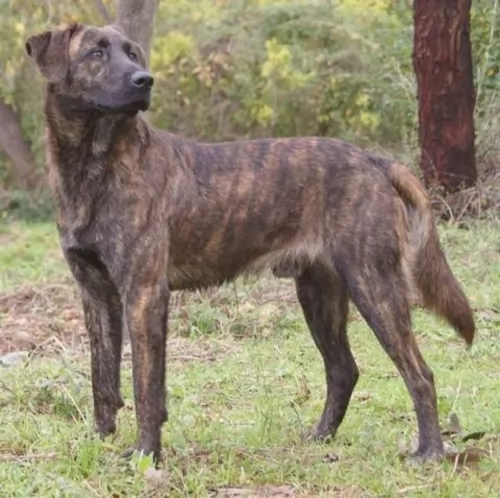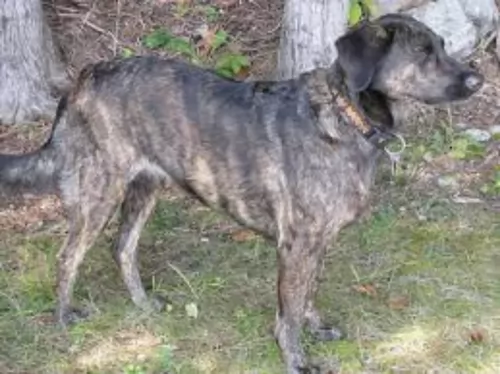 Petzlover
Petzlover Lancashire Heeler is originated from United Kingdom but Treeing Tennessee Brindle is originated from United States. Lancashire Heeler may grow 30 cm / 11 inches shorter than Treeing Tennessee Brindle. Lancashire Heeler may weigh 17 kg / 37 pounds lesser than Treeing Tennessee Brindle. Both Lancashire Heeler and Treeing Tennessee Brindle has almost same life span. Both Lancashire Heeler and Treeing Tennessee Brindle has almost same litter size. Both Lancashire Heeler and Treeing Tennessee Brindle requires Low Maintenance.
Lancashire Heeler is originated from United Kingdom but Treeing Tennessee Brindle is originated from United States. Lancashire Heeler may grow 30 cm / 11 inches shorter than Treeing Tennessee Brindle. Lancashire Heeler may weigh 17 kg / 37 pounds lesser than Treeing Tennessee Brindle. Both Lancashire Heeler and Treeing Tennessee Brindle has almost same life span. Both Lancashire Heeler and Treeing Tennessee Brindle has almost same litter size. Both Lancashire Heeler and Treeing Tennessee Brindle requires Low Maintenance.
 The Lancashire Heeler, known also as the Ormskirk Heeler or Ormskirk Terrier, hails from England and is looked upon as a vulnerable breed by the Kennel Club in the 21st century.
The Lancashire Heeler, known also as the Ormskirk Heeler or Ormskirk Terrier, hails from England and is looked upon as a vulnerable breed by the Kennel Club in the 21st century.
He was developed to be a cattle drover, but is essentially a companion dog today. Exact details of the origin of the Lancashire are unknown, but it is generally accepted that Welsh Corgis were used as well as a kind of black and tan terrier known as the Manchester Terrier.
In England, he has been known as a general working dog for more than a century.Gwen Mackintosh began breeding these dogs in the 1960s and the Lancashire Heeler Club was established in 1978. The dog was also placed on the Endangered Breeds in 2003.
 There doesn’t seem to be 100% clarity on how the dog came about but it originated in USA. It appears as though it was only since 1995 that records have been maintained through the American Kennel Club's Foundation Stock Service Program.
There doesn’t seem to be 100% clarity on how the dog came about but it originated in USA. It appears as though it was only since 1995 that records have been maintained through the American Kennel Club's Foundation Stock Service Program.
A Reverend Earl Phillips, who was a writer for a hunting magazine became aware of a Brindle Cur with a brown coat and tiger stripes. In fact ‘treeing’ is a type of hunting, where the dog chases an animal into a tree to escape. He heard about the dog’s amazing hunting skills.
In the early 1960s, he later formed The Treeing Tennessee Brindle Breeders Association, designed to protect the breed. It was in 2013 that the dog got foundation stock status with the American Kennel Club, but isn’t registered with the American Kennel Club.
 As a small breed dog, the Lancashire Heeler stands at 25 – 31cm in height, both male and female, and the dog weighs in the region of 2 to 6kg.
As a small breed dog, the Lancashire Heeler stands at 25 – 31cm in height, both male and female, and the dog weighs in the region of 2 to 6kg.
Looking quite similar to a Corgi or a German Shepherd with short legs, the Heeler’s legs are meant to be fairly straight and not bandy-legged. He has a short, weather-proof coarse coat that can be black or liver-colored, with tan markings. The coat is regarded as low maintenance. The hair is slightly longer around his neck.
The ears are erect, the eyes brown and bright and the tail these days is left long with a slight curl.
Intelligent, stubborn, strong willed, playful and friendly, the Lancashire Heeler is capable of making you an excellent pet and companion.
This dog is smart and learns quickly. He is energetic and playful, strong and robust and more than willing to take part in all the activities that you’re taking part in.
With training and socialization he makes a splendid pet, but he doesn’t put up well to abuse and disrespect from younger children. He is willing to get along with other pets in the home too.
 The Treeing Tennessee Brindle is a medium sized, deep chested breed of Cur, descending from the Old Brindle Cur dog.
The Treeing Tennessee Brindle is a medium sized, deep chested breed of Cur, descending from the Old Brindle Cur dog.
These strong dogs have a short, smooth brindle coat that is fairly soft to the touch. The coat's color is a mix of tan, black and a little bit of white.
He stands at between 41 and 61cm in height and weighs between 14 and 23kg both male and female. The Treeing Tennessee Brindle has a loud bark and it is best that this dog lives on a farm or in the suburbs as opposed to living in a small space in the city.
The Treeing Tennessee Brindle is a friendly, social dog and this is why he doesn’t make a particularly good watchdog.
He gets on well with children in the home as well as other dogs, not showing any aggression towards them.
They’re intelligent dogs and it will be a good idea to have them trained and socialized to make them well balanced and well behaved.
 As with any dog breed, there are wide variations in temperament. A dog essentially turns out the way it was brought up, similar to a child. Angry, harsh, aggressive, uncaring dog owners produce a dog that is both timid and aggressive, unsure, frustrated and with behavioral problems.
As with any dog breed, there are wide variations in temperament. A dog essentially turns out the way it was brought up, similar to a child. Angry, harsh, aggressive, uncaring dog owners produce a dog that is both timid and aggressive, unsure, frustrated and with behavioral problems.
Make your dog part of your family, provide him with good food, exercise and love and he will make an awesome pet.
The Lancashire Heeler is such an amicable, social dog at heart, and treated well, he will turn out like is inherent characteristics. He is an outgoing, friendly dog, more so when he has been trained and socialized. He will adapt to city- or country life, so long as he is exercised each day.
The Heeler has a good, balanced temperament, and counted in as a loved family member, you’ll make sure he stays that way.
 This brindle-colored cur dog is brave, intelligent and lively and his temperament allows him to be a good companion for his human family.
This brindle-colored cur dog is brave, intelligent and lively and his temperament allows him to be a good companion for his human family.
Even though they are friendly around strangers, they still make good watchdogs and will alert you to all kinds of visitors to your property. They do best in a home with large grounds and an active family where they can explore and sniff around. At the end of the day, they love to lie contentedly at your feet, a loyal, loving companion.
 Your Heeler can live to be 14, 15 or 16 years of age and live even longer than this with the right care. He is such a healthy breed, but one of the common dog illnesses to look out for are eye diseases.
Your Heeler can live to be 14, 15 or 16 years of age and live even longer than this with the right care. He is such a healthy breed, but one of the common dog illnesses to look out for are eye diseases.
This is where the ligaments of the eye are weakened so that the lens actually loosened and then displaced, causing pain for the dog. This displacement can obstruct fluid drainage from the eye too and your vet may need to perform surgery.
The shock-absorbing intervertebral discs can have spinal compression and contribute to significant pain for your pet. Early signs will see your Lancashire Heeler being reluctant to jump on his chair like he may once have done. Preventing obesity is important for reducing pressure on the dog’s spine.
 The Treeing Tennessee Brindle is a robust, healthy breed. You’re not likely to battle with too many health issues with him.
The Treeing Tennessee Brindle is a robust, healthy breed. You’re not likely to battle with too many health issues with him.
Watch out for ear infections which are more common in floppy eared dogs. Other common dog diseases that you need to know about -
This is a viral disease which is highly contagious and with no known cure. It’s why there is a vaccine against it. Coughing, lethargy, high temperature and loss of appetite with vomiting are symptoms of this disease.
This is another highly contagious respiratory viral infection transmitted between dogs in close proximity to each other, like in kennels for instance.
Symptoms include coughing, sneezing, nasal discharge, breathing difficulties, lethargy and loss of appetite. It’s important to get veterinary assistance as pneumonia could set in.
 Known as a low maintenance dog, the Lancashire Heeler’s short coat will require little grooming, just a good brush twice a week.
Known as a low maintenance dog, the Lancashire Heeler’s short coat will require little grooming, just a good brush twice a week.
If your Heeler doesn’t wear his nails down naturally, they will need to be clipped as part of the grooming process. Ears should also be checked regularly. Excess wax and dirt can build up which can lead to an ear infection. This can drive your dog mad with frustration. Teeth also need to be brushed regularly.
Remember, if you feel guilty for not getting to grooming your pet, there are professional groomers at your local vet or who work independently and they will do all of this for you.
Your Lancashire Heeler is such a social, active little dog who is always willing to be counted in to all your fun and games. If you’re lucky to have a fair sized garden, involve him in some ball games, or use a rope for him to tug on while you pull the other side. Whenever you go for a walk, he will be thrilled to join you as he loves picking up all those new scents outside his garden.
Nutritious food is important for longevity and health in a dog. Every dog has different dietary needs throughout their lives – when they’re puppies, when the female is pregnant, after they’ve been spayed or neutered, as a working dog, when they’re sick, when they’re old and so on.
There are some good dog brand foods to use, but you want to choose the best ones to ensure your dog gets all the vitamins and minerals needed as opposed to those that are packed with colorants, preservatives and fillers.
Home-made food is important too and some cooked chicken, cooked rice and raw or cooked vegetables can be added to his dry kibble from time to time. Don’t complicate your dog’s diet – just feed him plain, wholesome food like this with a little bit of raw meat added in occasionally. Simple, nutritious food will ensure he is energetic, bright eyed and happy. Make sure he always has fresh, cool water.
 A brush once or twice a week will be sufficient for this dog. Look inside his ears for signs of redness which could indicate an ear infection. Make sure his eyes are still bright and not red and with a pus discharge. Trim his nails too.
A brush once or twice a week will be sufficient for this dog. Look inside his ears for signs of redness which could indicate an ear infection. Make sure his eyes are still bright and not red and with a pus discharge. Trim his nails too.
The Treeing Tennessee Brindle is a high energy dog and he is going o want more than just a walk every day, although he will love that and rely on you for this daily outing.
He will also want ball games and hide and seek games.The breed needs an active owner who will take him on long walks and hikes.
Whenever you opt to give a dog commercially manufactured dog food, you need to check that the dog food is made with high-quality ingredients which are mostly made up of protein or meat.
Certainly a puppy will need protein in his food for proper growth and he will require 4 bowls of food a day. An adult dog will require 2 bowls of food a day.
The type of commercial dog food you buy will depend on the age of your dog as well as his activity levels. If your dog has a known allergy or illness, there are dog foods manufactured with that in mind.
Try and in include some homemade food into his diet. Nothing spicey and exotic as this can cause stomach problems. A good guide is boiled chicken, brown rice and vegetables.